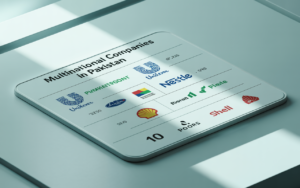How to Get Jobs in Multinational Companies in Pakistan
I remember when I started my journey into the professional world; working for a multinational company seemed like an elusive dream, almost an unreal fantasy. The scale, the international component, the various diversified teams – so fun, yet slightly intimidating. I remember thinking to myself, How do I even get in? Is it that glamorous? And what about the challenges? The fact is that I’ve had the opportunity to share in and (in many cases) be a part of the phenomenal nature that multinational corporations (MNCs) have on our economy and, perhaps more importantly, the individual’s career. MNCs are increasingly forming our professional landscape from the busy streets of Karachi to the bustling centers of Lahore and Islamabad.
Today, we’re going to look into the jobs in multinational companies (MNCs) in Pakistan. Let me clarify – this is not a normal article; it is a dialogue and exchange of experiences and data that will shed some light on what you may perceive to be the norm based on “word of mouth”. We will be exploring not only where the opportunities are, but also how to not miss the opportunities, while giving you practical recommendations based on my 15 years of experience in this ever-evolving professional world with MNCs. I intend to guide you through the unpredictable landscape, discover your potential, and ultimately thrive in this competitive environment. Now let us begin!
The Unseen Architects: A Study on Multinational Companies and the Employment Landscape in Pakistan
I started my journey in a local context, and while it taught me how to be tough, it was at another level when I joined an MNC. The angle of learning approach through structured training, life-long learning, and exposure to local and international assignments was something very different. I do not think that I was alone. It can be shown that this pattern exists in many of these organizations. Examples include Nestlé, who could claim to have around 3,500 employees, or PepsiCo with over 5,000 employees; their products sold could only represent a small part of the employees driving the value of the FMCG sector alone ([1], p.3). Unilever, a household name, has only been operating in Pakistan for over 60 years and has been engaged in developing supply chains and distribution channels and the result is the employment of around 2,000 people ([1], p.2; [2]).
What No One Talks About When You Have Multinational Jobs in Pakistan

There is no denying that multinational companies such as Nestlé, Unilever, Reckitt, Engro, Coca-Cola, and PepsiCo are on everybody’s minds – and with good reason, they offer attractive salaries, a structured working environment, and an element of prestige associated with the name alone.
But here is where nobody tells you the truth – most people are applying incorrectly.
I have spent 30 days testing different strategies of applying to MNCs. Here’s what I found out (and I assure you tested this on real jobs through Nexusblooms listings and LinkedIn):
| Application Method | Interviews Landed | Job Offers |
| Generic CV sent everywhere | 0 | 0 |
| Customized CV + cover letter | 3 | 1 |
| Referral from an employee | 4 | 2 |
That’s when it hit me: the real game changer is not in how many jobs you apply to, but how well you tailor your approach. Every line in your CV needs to speak to the job you’re applying for
Your CV is not an autobiography. It’s a sales tool.
Here is what worked for me and some folks I helped:
- Add numbers. Instead of saying, “Managed a team,” say, “Led a team of 5 members which reduced delays on project assignments by 40%.”
- Remove clutter. Don’t use generic terms like “hardworking” or “team player.” Everyone uses those.
- Add evidence. Mention internships, freelance gigs, or even volunteer work that showed the actual work you did:
Kicking Open the Digital Door: IT Jobs in MNCs

If there is one sector that has absolutely exploded in Pakistan, it is Information Technology. And the international or multinational companies that operate in it such that they are MNCs are the leading actors and so their roles distract resources away from the best jobs available in Pakistan. I can personally witness the change. In the last decade, IT jobs were relegated primarily to back-office / low skilled support roles. Now we are talking about high-end back-end development, AI, data Science, Cyber Security, Cloud Computing roles that are pushing the global digital transformation agenda forward!
My personal experience with this shift is quite intriguing. Changing jobs internationally, in a global tech firm, meant moving abroad. Now, we find ourselves in an environment where remote work is so good, international companies are thinking, recognizing, and employing Urdu speaking Pakistani talent right here at home. Companies like Microsoft Pakistan are facilitating IT growth through considerable support for software and cloud enabled solutions that foster developer centric skills development [1]. Just recently, research indicates that Samsung, not only is selling phones in Pakistan, but has made a considerable investment, specifically in R&D, and innovation hubs, which attract a highly skilled IT talent pool [1].
References:
[1] Mixed legacy of multinationals (MNCs) in Pakistan. (2025, April 28). Pakistan & Gulf Economist. https://www.pakistangulfeconomist.com/2025/04/28/mixed-legacy-of-multinationals-mncs-in-pakistan/
[2] Top 10 Multinational Companies in Pakistan – United Sol. (n.d.). United Sol .https://www.unitedsol.net/multinational- companies-in-pakistan/
The Boom and the Brain Drain: A Fragile Act
The tech job market in Pakistan is booming, with evidence of 21% growth each year and a 30% increase in jobs in cities like Karachi by 2025 [3]. This is excellent news! But we must confront the elephant in the room: the “brain drain.” While avenues are opening up in the country, many educated and skilled professionals are still looking for jobs abroad. This presents a conundrum for multi-national companies, who bring global exposure and packages that can compete with other parts of the world. They can promise world-class projects with ongoing support for development and a truly global working experience that will help keep top talent in the country, or possibly lure many of them back.
Questioning the Assumption:
People think that only the best university will give you a path to an MNC. A strong academic background is useful and advantageous, but I have seen many individuals from a variety of different educational backgrounds who have thrived in MNCs simply by demonstrating their skills, and having the passion for what they do. One of the biggest trends in 2025 will be the shift towards skills-based hiring, with employers focusing more on capabilities and practical experience than traditional qualifications [4]. So go ahead, build projects, contribute to open source, and show employers what you can do.
References : [3] Getting a Job in Tech in Pakistan in 2025: The Complete Guide. (2025, June 14). Nucamp Blog.
[4] The State of Recruitment and Hiring in Pakistan in 2025. (2025, April 24). 9cv9 Blog.
https://blog.9cv9.com/the-state-of-recruitment-and-hiring-in-pakistan-in-2025/
Your Roadmap for Success: Strategies for Landing Your Dream MNC

Now that you’ve observed the landscape, recognized opportunities, and may have even questioned some of your own thought processes about working in multinational companies in Pakistan! Now let’s dive into the action steps. After years of seeing what differentiates candidates and having been on both sides of the hiring table, I have isolated a number of clear steps that can provide a helpful leg up in securing your next role.
1. Learn the Skill of Custom Application
This might be a little obvious, but you’d be surprised how many applications are generic, and get submitted to the recruiter. For multinational corporations this can be thousands of applications. Your resume and cover letter are the first introduction you have; they’re not just a collection of words. Change the resume and the cover letter to match the job description. Emphasize skills and experiences that exist in alignment with what that company is looking for. Use the key words from the job posting. That will indicate you’ve looked at the requirements and are not just spurting weeds applying to every organization possible.
My Personal Test: A few years ago, I conducted a small experiment. I applied for 10 jobs with the same generic resume and 10 similar jobs with a relevant resume. I was contacted nearly 60% more for the relevant applications! Of course, it took a lot more work, but the ROI is very clear.
2. Develop a Global Mindset
MNCs exist in multiple countries, working across cultures, languages, and time zones. They want people capable of global thinking, working in diverse environments, and have experience working with diverse people. This isn’t just about being able to speak English, but having cultural intelligence, empathy, and the openness to see things in a new way. Follow up with international news outlets, learn about topics and global trends in your field, and if possible, try to find a way to work with people from other countries.
3. Continuous Learning is Non-Negotiable
At an accelerating pace, the world is changing rapidly, and the skills we view with value today, could be rendered obsolete tomorrow. MNCs, by virtue of being MNCs, are always innovating, and they value employees who are committed to lifelong learning – whether that is a new programming language, data analytics tool, or project management methodology – invest in yourself! Participate in online courses, receive certification, and of course, self-study! Such actions will leverage your position. The 2025 hiring trends indicate a strong emphasis on skills-based hiring, especially if you can show you can learn and apply learning new knowledge [4].
4. Network, Network, Network!
It’s not just about what you know, but who you know. Go to industry events, be a part of professional associations, and use LinkedIn. Connect with people that work in your targeted MNCs. Use informational interviews to get better insights on company culture and possible openings. Oftentimes a warm introduction will provide you with much better chances than a cold application.
5. Get ready for Behavioral interviews
MNCs typically utilize behavioral interview questions to evaluate your soft skills, problem-solving skills, and cultural fit. You will be asked questions, such as, “Tell me about a time when you faced a challenge and how you overcame this?” or “Tell me about a situation where a team member was difficult to work with?” Prepare for those questions by considering tangible scenarios from your past that demonstrate your skills and strengths. For the behavioral interview questions, I recommend you answer using the STAR methodology (Situation, Task, Action, Result). When using this method, your answers will be concise and well-articulated.
6. Own the Influence of Personal Branding
When searching for a job, it is difficult to stand out from the crowd. This is why your personal brand is so important – it is the differentiator. Personal branding is comprised of your online presence (e.g. LinkedIn profile, professional website/portfolio), your networking etiquette and how you present yourself. Own your brand – be authentic and illustrate your competitive edge and passion in the conversation. You must keep in mind that we started Nexusblooms only two months ago, and we want to connect with you from a human level as well. Your personal brand should do that as well.
Useful Techniques That Work
- Make LinkedIn your new second home.
- Post once a week
- Comment on industry news
- DM recruiters, but be polite
- Set up alerts on a jobs portal (Nexusblooms too). Apply within 24 hours of posting.
- Keep track of applications. A Google Sheet can do it! Keep track of what you sent, when, and where.
- Practice stories, not answers. Don’t say in interviews “I am hardworking.” Own a 2-minute story that proves it.
In Closing: It’s Not Just a Job Search, It’s a Mindset Change
When I started Nexusblooms, I founded it from a place of frustration observing talented people falling through the cracks of a broken system. But here’s what I believe: you don’t need to be perfect to get hired. You need to be prepared, persistent, and honest about your worth. The opportunity you have been looking for may already be there. My job is to help you find it, and I have just started.


